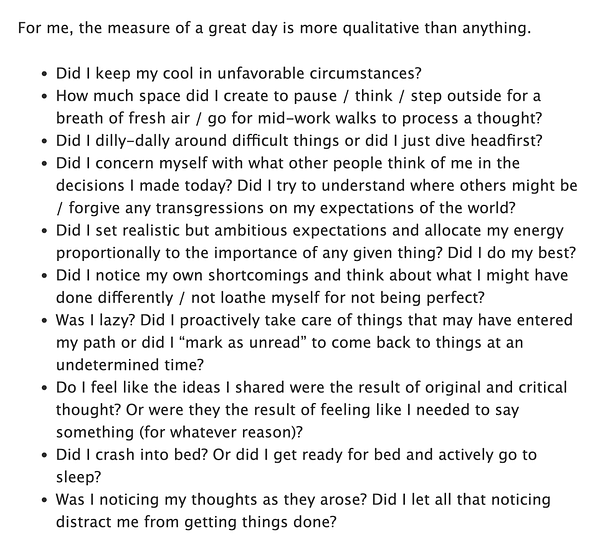To Be And To Last #36
This week we explore digital James Bond, second-order effects in Tanzania, and a scoreboard for your day.
The end of offline spying?
Evading a local police officer is less meaningful when passenger flight data flagged you as a spy risk before your plane even landed, and fake passports don’t get much play when facial recognition identified while you collected your baggage.
Add data hacks like the US Office of Personnel Management failure in 2014 (where 22 million records on government employees were stolen by a foreign power), and suddenly the last 100 years of spycraft is rendered useless.
Of course, intelligence agencies all around the world are adapting to this high-tech world. The solution involves a lot more keyboards than shoes.
What does a good day look like?
The deadly seriousness of second-order effects
Years ago I had the joy of spending two weeks in Tanzania. Ahead of my trip, I read George Monibot’s No Man's Land, on the nomadic people of Kenya and Tanzania.
What I remember most powerfully is the way well-intentioned decisions can have dreadful second-order effects:
Wheat farming: Bailing out of a financial crisis, a Canadian company helped start a wheat farming industry. Only wheat wasn’t a staple of the local diet, and poor farming practices leached the nutrients from lands needed by nomadic people.
Forest management: At the same time, efforts to preserve some wilderness led to new laws that banned all humans from vast lands also used by nomadic people. The people lost their land, and the land lost it’s centuries-long caregivers.
Moving fast and breaking things might work for an early-stage startup, but moving slow and watching for second-order effects is often a better route for mature businesses and governments.
As it turns out, it’s much easier to accidentally break things than it is to repair them.
To Be And To Last: Thinker Nate Desmond’s weekly roundup of long reads, contrarian thoughts, and hidden jewels that aren’t getting enough attention.
You likely joined on NateDesmond.com or BuckFiftyMBA.com.
Got thoughts? nate+newsletter@natedesmond.com.






